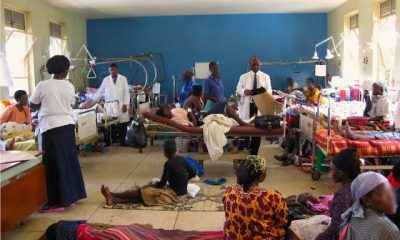News
Anthrax: NBMA cautions govt., confirms first case in Nigeria

The National Biosafety Management Agency (NBMA) has urged Nigerians to exercise caution following a reported case of anthrax on a farm in Suleja, Niger close to the Federal capital Territory.
The Director-General of NBMA, Dr Agnes Asagbra made the call in a statement made available to the News Agency of Nigeria (NAN) on Tuesday in Abuja.
Asagbra said that there have been reports of animals exhibiting symptoms of a potential case of anthrax at Gajiri along the Abuja-Kaduna motorway in Suleja LGA, of Niger.
“Some of the animals showed symptoms including blood flowing from their body openings, including their noses, eyes, ears and mouths.
“The case happened on a multi-species farm with cattle, sheep and goats on the said farm,” she said.
Asagbra said that the Federal Government sent a response team to visit the farm and took samples for testing of which the result has been confirmed to be positive, making it the first recorded case of anthrax in Nigeria in recent years.
The DG urged the general public to avoid direct contact with sick or dead animals especially those exhibiting symptoms associated with anthrax.
She further urged farmers, herders and individuals involved in animal husbandry to take extra care and seek veterinary assistance if they suspect any sign of illness in their livestock.
The News Agency of Nigeria (NAN) reports that the NBMA had on June 13, issued a warning to Nigerians about Anthrax, a potentially fatal disease that can be contracted from infected animals or through contaminated products.
This was after receiving report of an anthrax outbreak in Northern Ghana where all infected animals had died.
Asagbra warned that Anthrax is a serious infectious disease caused by a spore-forming bacterium which mainly affects livestock particularly cattle, sheep and goats.
She said that humans can become infected through contact with an infected animal or by inhaling spores.
“The sickness, is a zoonotic disease caused by germs that may spread from animals to humans.
“If anthrax is not identified and treated promptly, it can cause pneumonia, serious lung issues, breathing difficulties, shock, and death.
“Symptoms of anthrax include flu-like symptoms like coughing, fever and muscular aches,” Asagbra said.
Asagbra implored all stakeholders in the food and agricultural industry to prioritise safety measures and adhere to biosafety regulations in order to safeguard the health of our citizens.
Headline
Prince Harry visits sick Nigerian soldiers in Kaduna

Prince Harry and his team visited the 44 Nigerian Army Reference Hospital in Kaduna to interact with wounded soldiers who are receiving treatment.
The Duke of Sussex is in Nigeria with his wife to champion the Invictus Games, which Harry founded to aid the rehabilitation of wounded and sick servicemembers and veterans.
Nigeria joined the Invictus Community of Nations in 2022 becoming the first African country to join.
Prince Harry’s visit to Kaduna came 68 years after his late grandmother Queen Elizabeth II visited the state during the time of the late Premier of Northern Region Sir Ahmadu Bello.




News
Senate approves death penalty for drug traffickers

Senate on Thursday, May 9, approved the death penalty for those convicted on the charge of drug trafficking in the country.
The punishment prescribed in the extant NDLEA Act is a maximum sentence of life imprisonment.
The resolution of the Senate followed its consideration of a report of the Committees on Judiciary, Human Rights and Legal Matters and Drugs and Narcotics, National Drug Law Enforcement Agency (NDLEA) Act (Amendment) Bill, 2024.
The Chairman of the Committee on Judiciary, Human Rights & Legal Matters presented the report during plenary, Senator Mohammed Monguno (APC-Borno North).
The bill, which passed its third reading, aims to update the list of dangerous drugs, strengthen the operations of the NDLEA, review penalties, and empower the establishment of laboratories.
Section 11 of the current act prescribes that “any person who, without lawful authority; imports, manufactures, produces, processes, plants or grows the drugs popularly known as cocaine, LSD, heroin or any other similar drugs shall be guilty of an offence and liable on conviction to be sentenced to imprisonment for life” was amended to reflect a stiffer penalty of death.
Although the report did not recommend a death penalty for the offence, during consideration, Senator Ali Ndume moved that the life sentence should be upgraded to the death penalty.
During a clause-by-clause consideration of the Bill, Deputy Senate President Barau Jibrin, who presided over the session, put the amendment on the death penalty to a voice vote and ruled that the “ayes” had it.
But Senator Adams Oshiomhole objected to the ruling, saying that the “nays” had it.
He argued that matters of life and death should not be treated hurriedly, but Barau said it was too late, as he failed to call for division immediately after his ruling.
The bill was subsequently read for the third time and passed by the Senate.
-

 Headline6 days ago
Headline6 days agoSuspend cybersecurity levy– Reps to CBN
-

 Business6 days ago
Business6 days agoNigeria needs over $2bn to revive Ajaokuta Steel Plant, says Minister
-

 Headline4 days ago
Headline4 days agoPrince Harry visits sick Nigerian soldiers in Kaduna
-

 Entertainment4 days ago
Entertainment4 days agoAMVCA Cultural Day: BBNaija’s Neo, Venita win Best Dressed Male, Female
-

 Headline6 days ago
Headline6 days agoTinubu resumes work after foreign trip
-

 News6 days ago
News6 days agoShan George’s money returned to Zenith Bank account
-

 Metro4 days ago
Metro4 days agoEx-Sports Minister laments after hospital neglected him for hours over N80000 deposit





